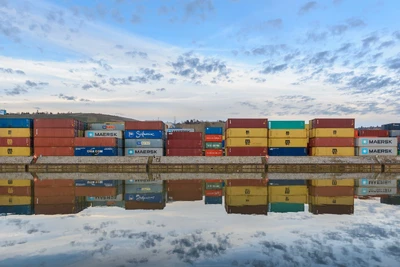
The global economy relies on a vast and intricate network of transportation to facilitate the movement of goods across borders. While air and land transport are crucial, there's an unsung hero in the world of logistics: global ocean freight. In this blog, we will dive deep into the significance of global ocean freight and explore how it serves as the lifeline of international trade.
Massive Cargo Volumes
Global ocean freight is responsible for transporting an enormous volume of goods. From everyday consumer products to industrial machinery, a significant portion of the world's trade moves across the oceans. The capacity of cargo ships is unparalleled in the world of transportation.
Cost-Effective Shipping
One of the primary reasons for the popularity of ocean freight is its cost-effectiveness, especially for bulky or heavy cargo. Shipping goods via ocean is often more economical than other modes of transport, making it a preferred choice for businesses looking to manage shipping costs.
Worldwide Reach
Global ocean freight connects virtually every corner of the planet. Ports and shipping routes crisscross the oceans, allowing for the efficient movement of goods between continents. This extensive network is essential for globalization and international commerce.
Diverse Trade Routes
Ships follow diverse trade routes, enabling them to reach various destinations efficiently. These routes are optimized for specific types of cargo and can vary based on factors like weather conditions and market demand.
Sustainable Shipping
In recent years, there has been growing emphasis on sustainable shipping practices. Many global ocean freight companies are investing in eco-friendly technologies and practices, such as slow steaming and the use of cleaner fuels, to reduce their environmental impact.
Carbon Footprint
While ocean freight is relatively more environmentally friendly than other modes of transport, there is still a need to address the carbon footprint associated with shipping. Efforts are underway to make ocean shipping even greener through innovation and regulation.
Port Operations
Ports are critical hubs in the global ocean freight ecosystem. They serve as points of entry and exit for cargo, facilitating the efficient loading and unloading of ships. The infrastructure and efficiency of ports play a significant role in trade.
Intermodal Transportation
Global ocean freight seamlessly integrates with other modes of transportation, including rail and trucking. This intermodal approach ensures that goods can be transported from the port to their final destination with minimal delays and disruptions.
Technological Advancements
The future of global ocean freight is intertwined with technology. Innovations like blockchain, IoT (Internet of Things), and automation are revolutionizing the industry, making shipping more efficient, secure, and transparent.
Sustainable Practices
Sustainability will continue to be a driving force in the industry. Shipping companies are investing in cleaner fuels, energy-efficient vessels, and emissions reduction technologies to align with global environmental goals.
Global ocean freight is the unsung hero of international trade, underpinning the global economy's success by enabling the efficient movement of goods across the oceans. Its vast reach, cost-effectiveness, and adaptability make it a vital lifeline connecting nations and driving commerce. As the industry evolves, with a focus on sustainability and technological innovation, global ocean freight will remain at the forefront of global trade, navigating the seas and connecting the world.
 2025 Amazon FBA rejects easy to melt goods how to do?April 7, 2025Urgent! Amazon US FBA new rules: easy to melt goods are marked “can not be delivered”? China Freight Forwarder Exclusive Solutionview
2025 Amazon FBA rejects easy to melt goods how to do?April 7, 2025Urgent! Amazon US FBA new rules: easy to melt goods are marked “can not be delivered”? China Freight Forwarder Exclusive Solutionview Latest U.S. Tariff Increases: Freight Carrier Responses & Market Shifts (Updated April 2025)April 27, 2024I. Carriers Expanding or Prioritizing U.S. RoutesEnhanced U.S. West Coast ServicesPriority Customs Clearance: Select logistics providers now offer expedited customs clearance for U.S.-bound shipments,...view
Latest U.S. Tariff Increases: Freight Carrier Responses & Market Shifts (Updated April 2025)April 27, 2024I. Carriers Expanding or Prioritizing U.S. RoutesEnhanced U.S. West Coast ServicesPriority Customs Clearance: Select logistics providers now offer expedited customs clearance for U.S.-bound shipments,...view Shipping Cargoes By Ocean, Air, Or Multimodal Transport?June 27, 2023In today's globalized world, shipping cargoes across international borders has become essential for businesses of all sizes, and it requires a reliable and cost-effective transportation solution. ...view
Shipping Cargoes By Ocean, Air, Or Multimodal Transport?June 27, 2023In today's globalized world, shipping cargoes across international borders has become essential for businesses of all sizes, and it requires a reliable and cost-effective transportation solution. ...view Drought-Hit Panama Canal to Restrict Access for One Year?August 31, 2023Ilya Espino, deputy director of the Panama Canal Authority, said that if the area where the canal body of water is located does not receive enough rain in the next few months, the ship restrictions on...view
Drought-Hit Panama Canal to Restrict Access for One Year?August 31, 2023Ilya Espino, deputy director of the Panama Canal Authority, said that if the area where the canal body of water is located does not receive enough rain in the next few months, the ship restrictions on...view